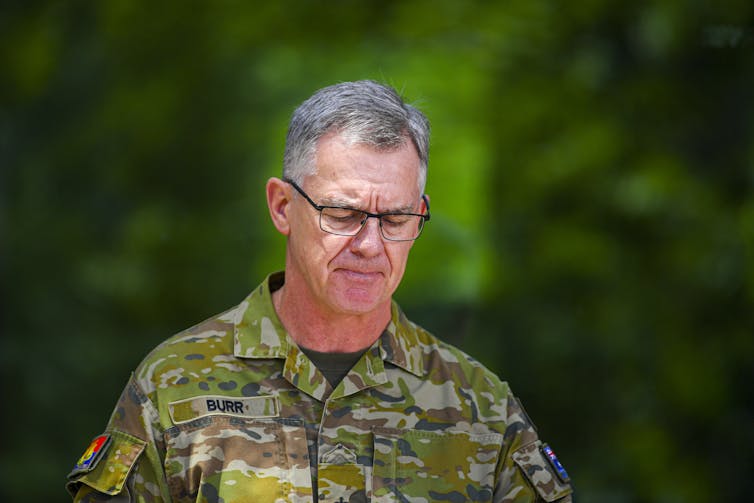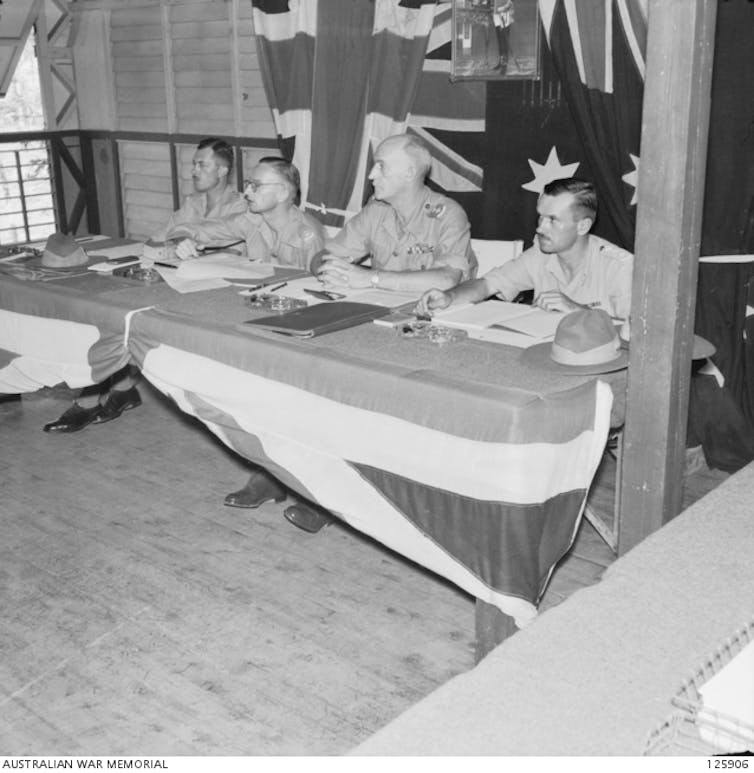Why Australian commanders need to be held responsible for alleged war crimes in Afghanistan
- Written by Paul Taucher, PhD Candidate in History, Murdoch University
Last week, Prime Minister Scott Morrison made clear he expects senior Australian officers to face some degree of accountability for any crimes allegedly committed by special forces in Afghanistan.
So far, however, others have been more circumspect. While Justice Paul Brereton’s shocking report last month called for 19 Australian soldiers to be referred to the federal police to be prosecuted for possible crimes, it stopped short of recommending commanding officers be held responsible.
Lieutenant-General Rick Burr, the head of the Army, cut short a news conference when asked whether he should resign in the wake of the scandal last week, and General Angus Campbell, the Defence Force chief, said commanding officers would be dealt with on a “case-by-case basis”.
 Burr says military leaders are ‘holding ourselves to account’ over the allegations raised in the Brereton report.
Lukas Coch/AAP
Burr says military leaders are ‘holding ourselves to account’ over the allegations raised in the Brereton report.
Lukas Coch/AAP
The Defence Force has foreshadowed there will likely be administrative punishment for some officers, including possible demotions, stripping of medals or removal from service.
This is a start. However, Campbell and the rest of the Defence Force leadership need to begin a serious discussion about the accountability and responsibility of commanding officers in the military as they move forward from the Brereton report.
Read more: Allegations of murder and 'blooding' in Brereton report now face many obstacles to prosecution
How commanding officers were dealt with in the past
This not the first time the Australian military has dealt with this complex moral and legal question.
After the second world war, Australia, the US, UK and other allies tried suspected Japanese war criminals under international law. These trials saw the first use of command responsibility.
This doctrine holds commanding officers responsible for crimes that are committed by their subordinates during wartime, when the commanding officers knew, or should have known, that they occurred. These crimes can include massacres, mistreatment of prisoners of war and murder.
Many Japanese officers were sentenced to death during the trials because they failed to prevent, halt or punish the crimes committed by their soldiers, even when they did not explicitly know the crimes were occurring. Other Japanese officers were more fortunate and received prison terms.
 The court martial convened in Darwin in 1946 to try Japanese prisoners of war charged with war crimes.
Australian War Memorial
The court martial convened in Darwin in 1946 to try Japanese prisoners of war charged with war crimes.
Australian War Memorial
Why accountability matters
The claim in the Brereton report that Australian officers were not in a position to know — and therefore to act — on alleged war crimes committed in Afghanistan has, in some eyes, absolved them of responsibility.
However, there seems to be an acknowledgement within defence circles that further actions could have, and perhaps should have, been taken by Australian commanders to address cultural issues within the SAS, and to impose greater scrutiny on units that were on high-intensity combat rotations.
Command responsibility is a difficult legal doctrine to grapple with. At the core, this is because officers could be held legally responsible for criminal acts they did not encourage, order or directly take part in under both Commonwealth military law and international laws.
Holding an individual criminally responsible for the actions of others goes against the personal responsibility that our criminal justice system is largely based on.
Nonetheless, it is important for several reasons that the Australian military holds its officers responsible for their units and subordinates.
For one, disciplining senior officers is critical for any attempt to reorganise and reform the Australian special forces following the explosive allegations put forth in the Brereton report.
The report revealed that some officers enabled a culture of heavy drinking, poor discipline and the pursuit of personal glory within the special forces. It is therefore critical these officers are removed from their positions to rebuild an effective, well-disciplined and respected special forces group.
Pursuing commanding officers is also important for the soldiers that served on the ground. The report has raised serious questions about how elite forces were pushed to their breaking point. Australia needs to know what role commanders had in that.
Of course, turning the focus on the moral responsibility of senior officers is not intended to absolve the alleged crimes committed by individuals. The point is simply that the military needs to demonstrate to the public, as well as to past and current members of the armed services, that senior officers cannot completely avoid responsibility for what happened.
Australia’s international reputation is at stake
Investigating senior officers, and where appropriate, taking action against them, is also an important part of restoring the reputation and credibility of the Australian military abroad.
The Australian Army has long been a respected member of international coalitions. It has built a reputation for working effectively with allies and partners, and for taking international law seriously.
It now faces an international scandal, and its reputation is at stake.
This is particularly the case in nations like Afghanistan, where the Australian military was instrumental in combating often brutal forces that held little regard for human rights. Counter-insurgency operations need to win the hearts and minds of the local population. For the Australian military to rebuild its reputation in countries where it operates, it needs to be able to hold itself accountable for its mistakes.
If we can’t do this, our position in the international rules-based system can be questioned, as it already has been. A failure to hold officers responsible also de-legitimises Australia’s questioning of foreign governments on human rights abuses, as well as the government’s calls for justice in other international crimes.
Authors: Paul Taucher, PhD Candidate in History, Murdoch University





